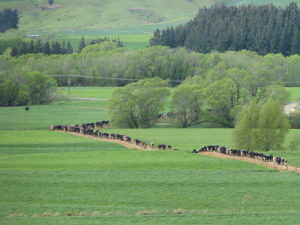Wired for Science: Understanding the feeding habits of mealybug
Fussy children might be frustrating, but fussy mealybugs could help protect the New Zealand wine industry from grapevine leafroll-associated virus 3.
 Hafiz M. Abrar Ilyas is comparing the difference between Pastoral Dairy Farms and Confined Animal Feeding Operations dairy systems in terms of energy consumption and environmental emissions.
Hafiz M. Abrar Ilyas is comparing the difference between Pastoral Dairy Farms and Confined Animal Feeding Operations dairy systems in terms of energy consumption and environmental emissions.
A Lincoln University PhD student is putting New Zealand’s vaunted paddock-based dairy industry to the test.
Hafiz M. Abrar Ilyas is comparing the difference between Pastoral Dairy Farms (PDFs) and Confined Animal Feeding Operations (CAFOs) dairy systems in terms of energy consumption and environmental emissions.
He says it is something that has not been done before but needs to be looked at if New Zealand is to take its environmental responsibilities seriously.
“Pastoral Dairy Farming Systems are common in New Zealand while the CAFO system is relatively new, but increasing in numbers especially in the South Island,” he says.
“The core advantage of using CAFOs system is that they have minimum soil disturbance, have more control over climate events and research has shown they can achieve higher milk production per cow.”
However, are they more energy efficient and able to reduce emissions?
A direct comparison will let the numbers speak for themselves.
“The intensification of New Zealand’s dairy industry, including its vertical and horizontal expansion could cause serious environmental issues,” Ilyas says.
New Zealand’s agriculture sector produces 46% of its greenhouse gas emissions, according to a 2014 Ministry for the Environment report.
Dedicated efforts and studies are required to look into the environmental impact the dairy industry is having on New Zealand, he says.
“The findings of this study can be useful for making environmental policy regarding NZ dairy production systems as well as help farmers in selecting appropriate farm management practices for the sustainability of the New Zealand dairy industry."
A qualified engineer, he is being supervised by Dr Majeed Safa and Professor Alison Bailey and will be surveying farmers using both systems, and hopes to have results in June, 2017.
As expected, Fonterra has lifted its 2025-26 forecast farmgate milk price mid-point to $9.50/kgMS.
Bovonic says a return on investment study has found its automated mastitis detection technology, QuadSense, is delivering financial, labour, and animal-health benefits on New Zealand dairy farms worth an estimated $29,547 per season.
Pāmu has welcomed ten new apprentices into its 2026 intake, marking the second year of a scheme designed to equip the next generation of farmers with the skills, knowledge, and experience needed for a thriving career in agriculture.
One team with 43 head, including a contingent from Mid Canterbury, are reflecting on a stellar NZ DairyEvent.
Fonterra farmer shareholders have approved the mechanism for a $2/share capital return expected from the sale of its global consumer and associated businesses.
Trainees in the horticulture industry studying towards a certificate or diploma can now apply for Horticulture New Zealand's (HortNZ) 2026 Industry Training Scholarships programme.
OPINION: Staying with politics, with less than nine months to go before the general elections, there’s confusion in the Labour…
OPINION: Winston Peters' tirade against the free trade deal stitched with India may not be all political posturing by the…